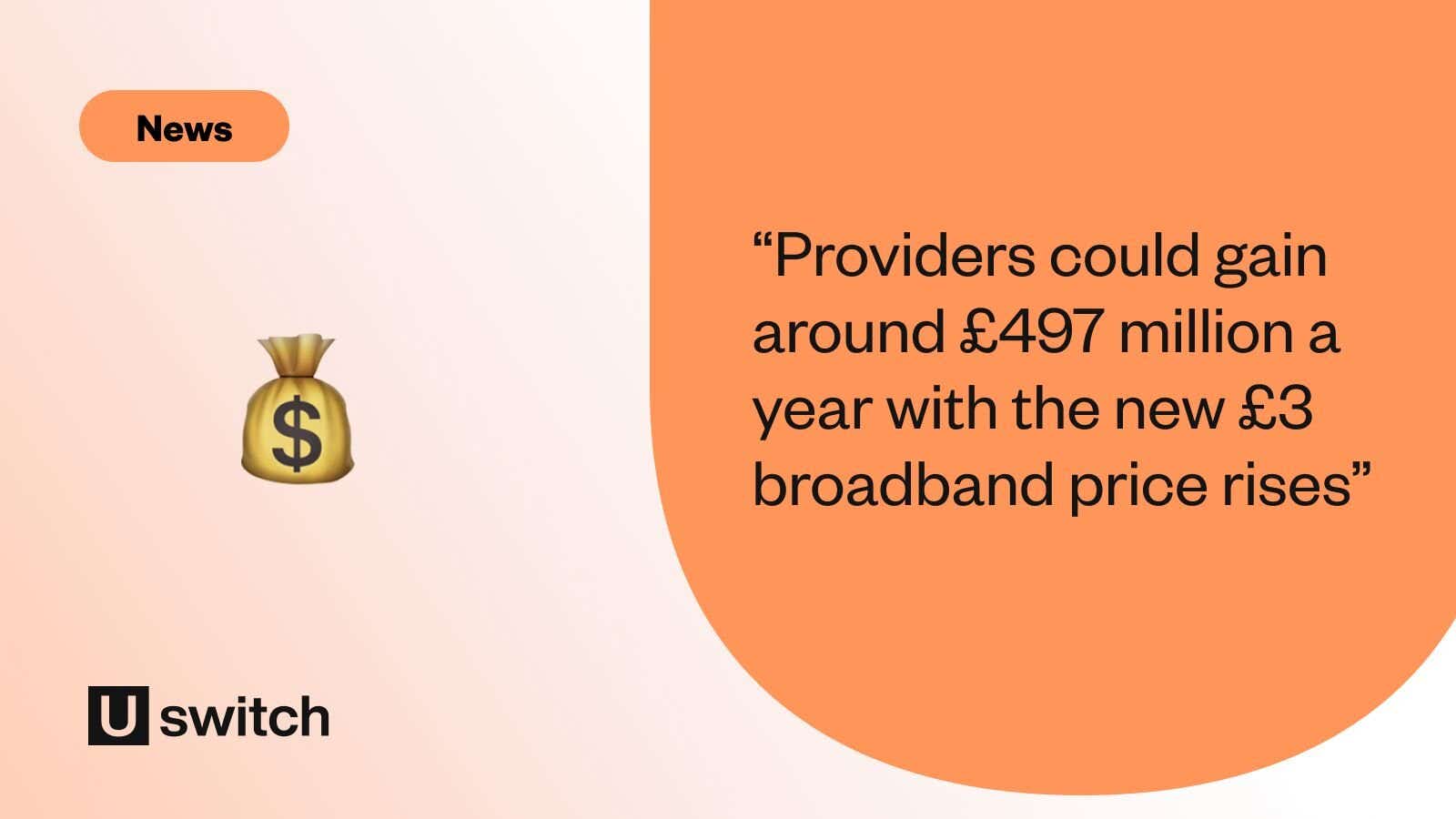Why broadband prices could be higher next year
New Uswitch research has found many broadband customers could see a bigger price increase in 2025 than they did this year, despite Ofcom's recent introduction of a ban on inflation-linked price rises.
The new ruling stated that providers must now stick to a fixed ‘pounds and pence’ increase for new customers, which they must make clear during the sign-up process. This has led to many providers introducing a flat £3 annual price hike, which, for the average broadband bill, would lead to a bigger price hike next year than the old system would have incurred, based on current levels of inflation.
As a result, our research highlighted that providers could gain around £497 million a year with these new £3 blanket broadband price rises.
How much did prices increase in 2024?
Historically, price increases were based on the Consumer Price Index (CPI) or Retail Price Index (RPI) inflation rates published at the start of each year. Providers often added around 3% to this rate to cover rising business costs.
This would normally result in a yearly price rise of about 4-5%, but with inflation rising as high as 10% across 2023-24, annual price increases over the last two years have amounted to up to 25% in some cases.
In light of this, Ofcom has now banned inflation-linked price rises, stating: “In recent years, many major UK phone, broadband and pay TV companies have changed their contract terms to include price rises that are linked to future inflation rates.
“This leaves customers without sufficient certainty and clarity about the prices they will pay and unfairly assuming the risk and burden of financial uncertainty from inflation, which is something people cannot predict and do not understand well. So we have decided to ban this practice.”
Under new Ofcom rules, starting in January 2025, all broadband customers taking out a new contract must clearly show any price increases they may face during their contract in pounds and pence at the point of sale. Many providers have adopted this practice early, with the likes of BT implementing it to all new customers from April 2024 onwards.
Which providers will be using the new Ofcom rules?
However, analysis from Uswitch.com indicates that the £3 monthly increase currently being applied by EE, BT, Plusnet, Vodafone, and TalkTalk equates to around a 9% annual rise on the average broadband bill. For customers on the cheapest plans, this could represent as much as a 13.6% increase. This is higher than the vast majority of annual price increases in 2024.
Sign up for our latest broadband offers and expert advice
Get more expert insights, browse our latest exclusive offers and find money-saving deals from Uswitch.
Table 1: Amount the average TalkTalk, BT, EE, Vodafone and Plusnet yearly broadband bill will cost in 2025 compared to what they would have cost based on July’s CPI rate (2.2%) + 3.9%
| Provider | Average yearly broadband contract cost | New yearly cost under new rules after 2025 price rise | New yearly cost if rises were based on current CPI rate (2.2%) + 3.9% (+3.7 for TalkTalk) |
|---|---|---|---|
| Vodafone | £308.04 | £344.04 | £326.78 |
| Plusnet | £415.08 | £451.08 | £440.40 |
| TalkTalk | £387.96 | £423.96 | £410.76 |
| EE | £433.92 | £469.92 | £460.32 |
| BT | £455.88 | £491.88 | £483.72 |
Richard Neudegg, director of regulation at Uswitch.com, comments: “While Ofcom’s incoming ban on inflation-linked price increases is a big improvement for transparency - the blanket £3 monthly increase some providers are choosing is a disappointing development.
“The new rules are designed to provide consumers with greater clarity. But the flat-rate approach risks being seen as a way to increase prices even more under the guise of making changes in the consumer’s best interests.
“If your contract ends before April 2025, it’s always worth shopping around for your next broadband deal. It only takes a few minutes to compare and see what else is out there, as many smaller broadband providers, such as Hyperoptic and Trooli, don’t raise prices mid-contract."
You can see the full list of broadband providers that don't raise prices mid-contract and all their available deals on our fixed-price broadband page.
Fixed price broadband deals
Compare our latest fixed broadband deals
If you are unhappy with your broadband provider or face a high price increase, then you can compare a range of great Broadband deals on Uswitch. For more information on what you can do about price increases, read our ‘Broadband mid-contract price increases in 2024, explained’ guide.
Broadband deals
Browse our extensive range of broadband deals




